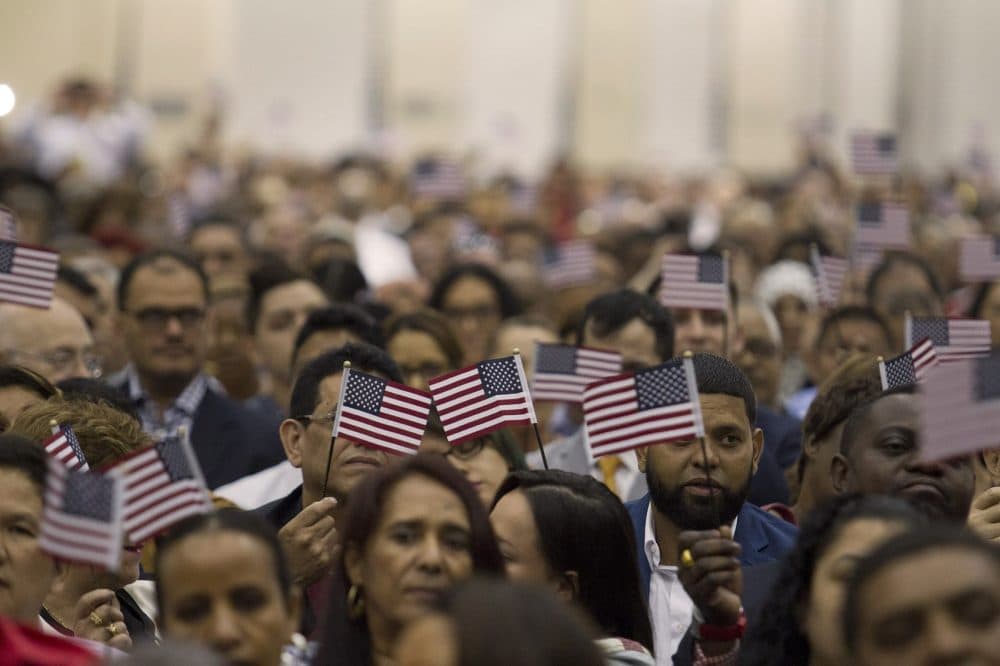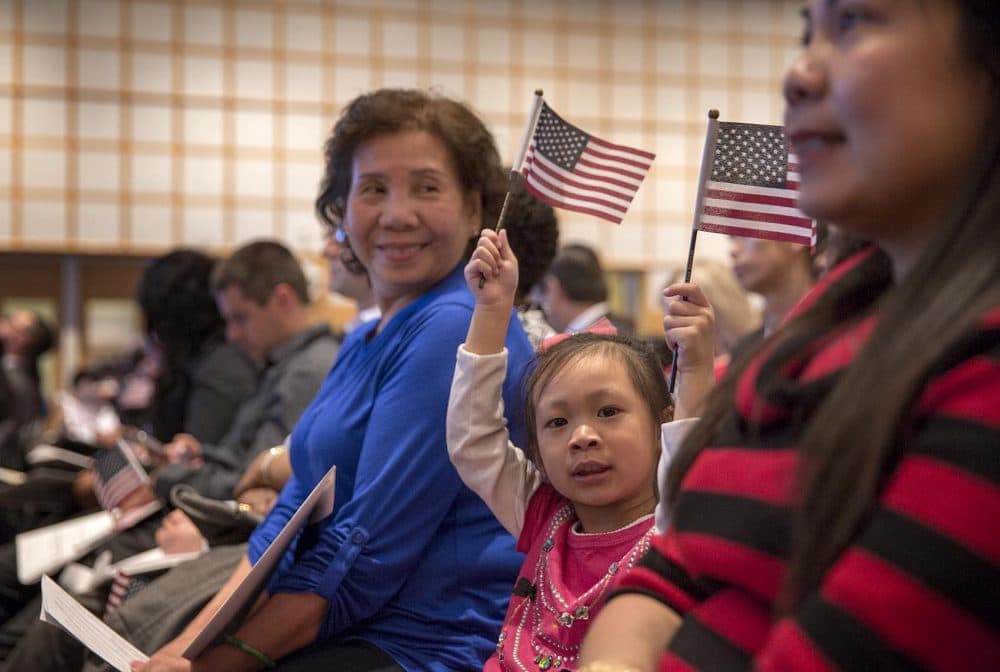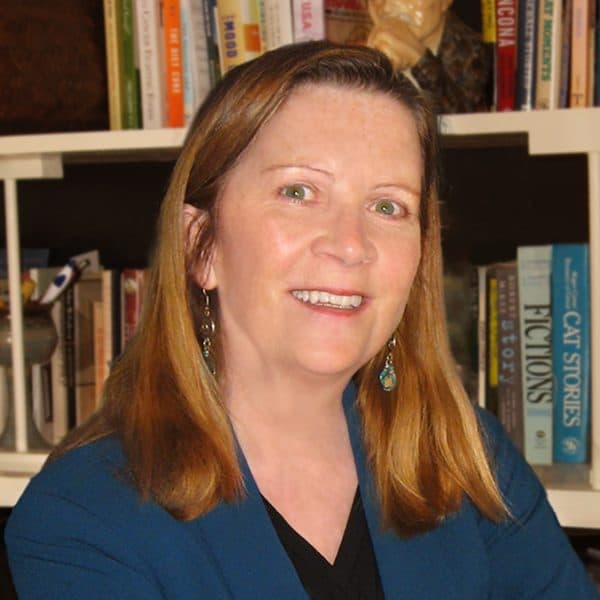Advertisement
Commentary
Choosing To Become An American Out Of Love, Not Fear

My first American job was as a restaurant dishwasher. I may be fusing nostalgia with memory here, but in that busy and broiling hot kitchen, my eight-hour shift flew by. I discovered that schlepping around overflowing trash bags and vats of food is way cheaper than any gym membership. Plus, I learned a whole new dictionary of curse words — in American English and in Italian.
As I sloshed through that kitchen, you could have asked me to name the current president, and I would have had to stop and think. Or perhaps I did know that the 40th American president was Ronald Reagan. But that would have been the limit of my political knowledge. I couldn’t have named our U.S. or state senators, much less whether they were Democrat or Republican or which policies they advanced or opposed.
Fast forward to last year, June 2016, when I drove to downtown Lowell to become a naturalized American citizen. That fine Wednesday morning, it was easy to spot us soon-to-be-citizens — all 798 of us. Rushing along in our native head scarves and saris and dresses and suits, we must have looked like a giant and very multicultural klatch of wedding guests.

From Jan. 1 to March 31, 2016, nearly 8,000 individuals applied for citizenship in Massachusetts — a 30 percent increase from the previous quarter. Meanwhile, for that same period, the United States saw a 34 percent increase in citizenship applications nationwide.
As we all filed into that Lowell auditorium, we were part of a national trend, and I wondered: How many of us were driven here by fear?
In most cases, you can only apply for citizenship after you have been a permanent resident — or green card holder — for a defined and uninterrupted period of time. Also, according to my USCIS handbook, "A Guide to Naturalization," citizen applicants must be "of good moral character based on the laws that Congress has passed." Certain grades of criminals are barred. Included in that crime list are things like prostitution, illegal gambling and the persecution of anyone because of race, religion, national origin, political opinion or social group. And, even for smaller crimes that have been expunged, failure to report them will get your citizenship application denied. So fraudsters and liars need not apply.
With some key exceptions, my green card had granted me the same live-and-work privileges as those enjoyed by my American-born husband. Over the years, as I upgraded from service to more living-wage jobs, I also upgraded my civic engagement. I went quasi native — so much so that fewer folks used that god-awful Barry Fitzgerald voice to mimic my accent back to me.
Without the legal right to cast my own ballot, there were some election years when I cheekily played backseat voter. Over time, socioeconomic privilege made me care more about our laws and legislators, and though my legal status said Resident Alien, I no longer felt like one.
As we all filed into that Lowell auditorium, we were part of a national trend and I wondered: How many of us were driven here by fear?
I don’t grouse about paying income or city taxes. In 30 years, I’ve done my share of pro bono and volunteer work, and, just like most of my American friends, I have my pet philanthropic causes.
None of these is goody-two-shoes altruism. Instead, these represent ordinary publicam bonum (public good). With or without a citizenship certificate, these acts are part of good citizenry 101.
Looking back, perhaps it was a surge in gratitude or patriotism that fueled the 2015 to 2016 spike in citizenship applications. But a funny thing happened on the way to the naturalization ceremony. While we immigrants were paying the fees and studying for the test, Google was reporting a concurrent spike in searches on how to legally move from the United States to Canada.
By the spring of 2016, we were faced with the prospect that America — a country that had gone to war to defend our own and other countries’ democracies — might entrust its own democracy to a man who, among other deal-breakers, had a political resume that was 100 percent blank.
So for immigrant and native-born, it was time to batten down the hatches, to protect what we had worked so darn hard to have.
I had a cracking good time in Lowell. My seat neighbors and I chatted and laughed. We tried to pronounce each other’s names, and we watched each other's stuff. In the days after the ceremony, I was brought to tears by the outpouring of congratulations and gifts, the sweet notes that said I was a welcome addition to this huge "we-the-people" nation. The small library where I volunteer surprised me with a red, white and blue cake with all the trimmings. Some of my sister activists said I had picked a bad year to become an American. One friend joked that I could have saved the expense by swapping her U.S. passport for my Irish one.

Now, six months into our new presidency, doesn’t that concept of "good moral character based on the laws that Congress has passed" have such a sweet, nostalgic ring to it?
Recently, a year after I became an American citizen, one friend asked if I have buyer's remorse.
I don’t. But I do have regrets — not on my own behalf, but for the circumstances that made me print up that "Guide to Naturalization" and pay the fee and study for the test with such urgency.
Back in that restaurant kitchen, I thought that the process of becoming a full-blown American would approximate the process of courtship and marriage. We start with a friendship, then a date, then turn exclusive, then cohabit or get engaged. Along the way, each step, each progression is a very conscious choice, fueled by our own joy and loyalty.
I always imagined that, when the big citizenship day arrived, when I publicly declared my affection and swore my allegiance to my adopted country, it would be for love, not fear.
